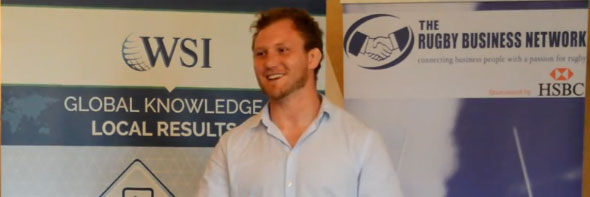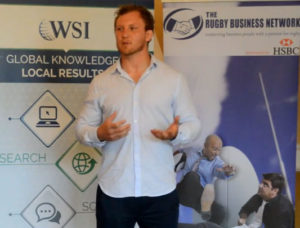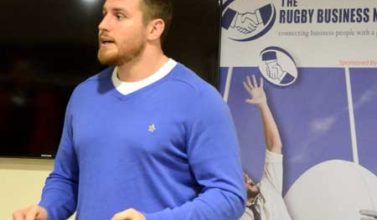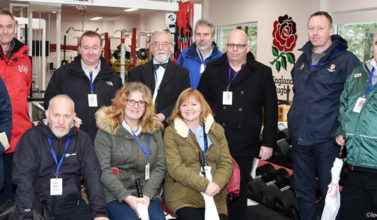
At the recent RBN held at the St Pierre Marriot Hotel and Country Club Bristol Rugby’s Nick Koster talked about rugby, charity and life after rugby.
The first thing everyone in the room wanted to know was How did everyone feel when they won the second leg of the championship play off, bringing them back to premiership rugby?
After an opening statement of ‘It was an incredible feeling” Nick went on to explain the feelings of the whole team long the way. “The championship is a tough competition and I think some people don’t realise how tough it is”. He went on to talk about a whole host of things that impact games in the championship that many people don’t give a second thought to. Things like, ground conditions, game tactics and sometimes, just how simply the fact that they are Bristol with a bigger budget makes a difference to the way that they are viewed by some opposition.
He talked about the pressure of play offs, especially when you have already conquered the league by 10 or 15 points, which has been the case when it comes to Bristol and previous seasons. “I’ve been involved in super league semi-finals and finals, but when it comes to the play offs, there’s nothing that really compares. You’re not really playing for the trophy; you’re playing for your livelihood; your future and your family.”
“When you’re so far ahead and you’ve worked all year, putting your body on the line, its heart breaking for the players to fall at the final hurdle”.
 Nick was quick to point out however, that he was not making excuses – they get paid to do a job and they need to perform when the weekends come around. He did reveal however, that there was a great sense of relief when they did achieve that promotion, possibly more so than celebration. And now the hard work starts. Looking ahead to their first few matches, they have some tough ones coming up early in the season and this year will be a challenge for Bristol. The level of play in the premiership is higher; the games are more physical, more intense and more tiring, both mentally and physically. “Now we’re there” said Nick “We’ve got a massive fight to try and stay here”
Nick was quick to point out however, that he was not making excuses – they get paid to do a job and they need to perform when the weekends come around. He did reveal however, that there was a great sense of relief when they did achieve that promotion, possibly more so than celebration. And now the hard work starts. Looking ahead to their first few matches, they have some tough ones coming up early in the season and this year will be a challenge for Bristol. The level of play in the premiership is higher; the games are more physical, more intense and more tiring, both mentally and physically. “Now we’re there” said Nick “We’ve got a massive fight to try and stay here”
We asked Nick how pre-season training was going, and whether the pressure was building in the run up to the opening games in September. “We’ve done a lot of fitness training” he said and then went on to explain a little about their regime, which like most clubs is focussed on fitness in the earlier weeks, building up to contact training at the latter end. “It’s the only time in the season when you’re looking forward to contact training” he said “Because you’re not likely to have a shoulder that’s falling off or a knee that’s swollen!”
They’ve had less time than some clubs as the championship playing season finishes later than the premiership which causes its own problems, especially when it comes to recruitment. By the time you finish the championship season, most players are already in contract “I think that’s where some teams who get promoted go wrong” said Nick “They have a rush at the end of the championship to recruit to help them at the next level, but by doing that they lose the culture of their organisation. If you’re not careful you can end up with half your guys playing with people they don’t really know and then you lose the team spirit that helped get you the promotion in the first place.”
Nick has every confidence that Bristol is getting the balance right. “We have an owner who’s invested in the club and committed to making it work” he said.
Moving away from rugby, I asked Nick how and why he got involved in Project Zulu. Along with Thinus Delport and Bath’s Francois Louw, Nick is an ambassador for the project which helps the people of the South African township of Madadeni. “The South African background was why I was approached in the first place, Thinus sent me a Facebook message” he said.
The Bristol based charity which brings a children’s choir to the UK to perform were exploring the rugby connection to find ambassadors in the area. Proceeds from those performances are then ploughed back into their schools in South Africa, providing amazing things like solar panels for power, computers and building new classrooms. As well as providing facilities for their schools, the charity gives the children the opportunity to travel. “These kids live in some really tough conditions” said Nick “A lot of them only live an hour from the beach but they’ve never seen the sea”
Nick and his wife Jeannie have hosted children from the last 2 tours and they say it’s been an amazing experience for them. They were astonished at just how happy the children are despite being used to so little. Laughing Nick talked about how they’d tried to spoil them while they were here, but he said, they were just so happy with the bare minimum, finishing off by saying how they’d really given them a lesson in happiness.
Nick went on to tell us a little about the apartheid years and why the project is so important to him. During that time the government spent roughly 6% of the education funds on black children, the remaining 84%, spent on white children. Clearly, not the fault of the children but the repercussions of that means that the country is still struggling with education now. “To be able to raise money and put that money straight back into schools will impact so many kids, not just for this generation but for future generations and that’s the main reason we’re so passionate about it” he said
A great cause and if you think you can help the charity in any way, get in touch with them. At the very least, look out for their next concert visit!
Finally we moved on to life after rugby – a topic we talk to most players about. Whilst everyone hopes that players have long careers, the nature of the game is such that careers can be over very quickly, sometimes overnight. So when asked whether he had given any more thought to life after rugby since we last met Nicks response of “Yes, and it keeps me awake at night” was no surprise to many.
He is currently studying for an MBA at Bath University because he wants to learn more about business, saying that while you meet lots of people, you don’t really get to learn about business. “You deal with people on a daily basis and there’s probably a lot of leadership and management involved in that as well as strategy in terms of learning how to beat the opposition. But when it comes to knowing and understanding how a business operates day to day, we don’t get that insight”.
He went on to tell us that when he started playing at the age of 18, he went straight into full time rugby, with no time for proper study or university degrees. Things have changed now (careful Nick, you’re starting to sound old!) and there’s a lot more emphasis on study and preparation for life after rugby. He went on to say that after 10 years or more of playing rugby (if you’re lucky and avoid serious injury), hopefully you retire from sport, but then you have to start all over again, and you have to question your value in the corporate world. What can you add to that environment other than some interpersonal skills?
“That” said Nick “Is where I think people struggle. They go from earning a good salary and being worth a lot to a club to suddenly not being worth that same value to any company. For me, the MBA is my attempt to bridge that gap.” He went on to tell us that depression post rugby is a very real factor and is really pleased that clubs, the RPA and networking groups like the Rugby Business Network are putting that emphasis on life after rugby and giving players the opportunity to work on transferring their skills and making the process easier.
But, when it comes to having a clear idea of what he wants do later in life, Nick is still undecided saying “ You know, everyone says they want to run their own business, but I think it probably sounds a bit more glamorous than it really is.” A statement fully supported by those in the room! Nick holds on to that dream of some day running his own business, but is clear that it needs to be something he is passionate about. In the meantime, he is interested in the sustainable energy sector and keeps his eye on what’s going on there, but in a complete turnaround also says he wouldn’t mind being a teacher or a farmer! So who knows? One thing for sure is that the MBA in business will certainly be a help whatever he decides to do.
We are all looking forward to some great local derby matches in the premiership this season where there will be a reasonable number of south west based clubs battling it out. We wish Nick and Bristol Rugby all the best for a great season.
Thanks must also go to Jade and her team at the St Pierre Marriott for looking after us so well.
Related Post
England’s Ben Morgan comes...
This month’s Rugby Business Network came to grass roots rugby club Dursley RFC and we...
- December 18, 2015
- By Nadine Thomas
- Rugby Business Network
Referee Malcom Miller on the...
At our recent event at the St Pierre Marriot Hotel and Country Club, Malcolm Miller gave...
- August 1, 2016
- By Nadine Thomas
- Business Growth
An unexpected reward for my...
In January this year I received an unexpected email with an invitation attached. On the...
- February 16, 2017
- By Nadine Thomas
- Blogging









Leave a Comments